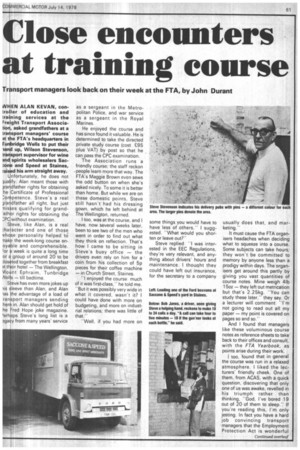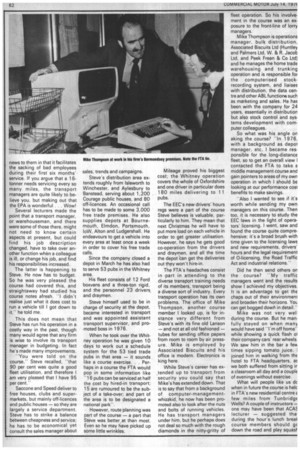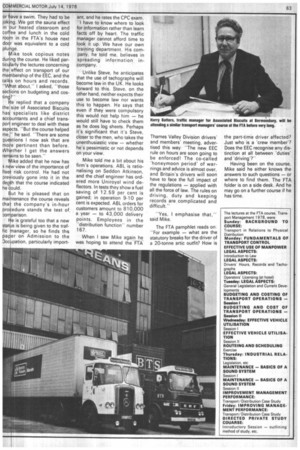Close encounters at training course
Page 63

Page 64

Page 65

If you've noticed an error in this article please click here to report it so we can fix it.
Transport managers look back on their week at the FTA, by John Durant
A/HEN ALAN KEVAN, controller of education and training services at the Freight Transport Association, asked grandfathers at a transport managers' course it the FTA's headquarters in funbridge Wells to put their land up, Wilson Stevenson, trar sport supervisor for wine i ind spirits wholesalers Sac:one and Speed at Staines, raised his arm straight away.
Unfortunately, he does not lua ify. Alan meant those with ya dfather rights for obtaining he Certificate of Professional :o petence. Steve's a real 3ra dfather all right, but just nis es qualifying for grand'ath r rights for obtaining the :PC without examination.
S eve, like Alan, is a real ha acter and one of those vhase personality helped to 'flake the week-long course en oyable and comprehensible, 'or week is quite a long time or group of around 20 to be Ilos ted together from breakfast it t ir hotel — The Wellington, Vic) nt Ephraim, Tunbridge Nel s — till bedtime.
S eve has even more jokes up is leeve than Alan. and Alan )as he advantage of a load of ran port managers sending he in Alan should get hold of he red Hope joke magazine. 'erh ps Steve's long list is a 3ga y from many years" service
as a sergeant in the Metropolitan Police, and war service as a sergeant in the Royal Marines.
He enjoyed the course and has since found it valuable. He is determined to take the directed private study course (cost £95 plus VAT) by post so that he can pass the CPC examination.
The Association runs a friendly course; the staff reckon ,people learn more that way. The FTA's Maggie Brown even sews the odd button on when she's asked nicely. To some it is better than home. But while we are on these domestic points, Steve still hasn't had his dressing gown, which he left behind at The Wellington, returned.
I too, was at the course, and I have, now several weeks later, been to see two of the men who went in order to find out what they think on reflection. That's how I came to be sitting in Steve's busy office — the drivers even rely on him for a coin from his collection of 5p pieces for their coffee machine — in Church Street, Staines.
-I enjoyed the course much of it was first-class," he told me. "But it was possibly very wide in what it covered, wasn't it? I could have done with more on budgeting, and more on industrial relations; there was little of that."
'Well, if you had more on some things you would have to have less of others,'" I suggested. "What would you shorten or leave out?"
Steve replied. "I was interested in the EEC Regulations, they're very relevant, and anything about drivers' hours and maintenance. I thought they could have left out insurance, for the secretary to a company usually does that, and marketing."
It must cause the FTA organisers headaches when deciding what to squeeze into a course. Some subjects can take hours; they won't be committed to memory by anyone less than a prodigy within days. The organisers get around this partly by giving you vast quantities of course notes. Mine weigh 4Ib 15oz — they left out metrication but that's 2.25kg. "You can study these later," they say. Or a lecturer will comment "I'm not going to read out all my paper — my point is covered on pages so and so."
And I found that managers like these voluminous course notes as reference sheets to take back to their offices and consult, with the FTA Yearbook, as points arise during their work.
I too, found that in general the course was run in a relaxed atmosphere. I liked the lecturers' friendly cheek. One of them, from ACAS, with a quick question, discovering that only one of us was awake, revelled in his triumph rather than thinking, "God. I've bored 19 out of 20 of them to sleep." If you're reading this, I'm only jesting. In fact you have a hard job convincing transport managers that the Employment Protection Act is wonderful news to them in that it facilitates the sacking of bad employees during their first six months' service. If you argue that a 16tonner needs servicing every so many miles, the transport managers are quite likely to believe you, but making out that the EPA is wonderful . . . Wow!
Several lecturers made the point that a transport manager, or warehouseman, and there were some of those there, might not need to know certain aspects at present, but could find his job description changed, have to take over another function when a colleague is ill, or change his job, and find his responsibilities increased.
The latter is happening to Steve. He now has to budget. So he was very pleased the course had covered this, and straightaway had studied his course notes afresh. ''l didn't realise just what it does cost to run a vehicle till I got down to it," he told me.
• This does not mean that Steve has run his operation in a costly way in the past, though many would agree that any firm is wise to involve its transport manager in budgeting. In fact he's made many improvements
-You were told on the course," Steve recalled, "that 90 per cent was quite a good fleet utilisation, and therefore I am very pleased that I have 95 per cent.''
Saccone and Speed deliver to free houses, clubs and supermarkets, but mainly off-licences and public houses — so they are largely a service department. Steve has to strike a balance between cheapness and service; he has to be economical yet consult the sales manager about sales, trends and campaigns.
Steve's distribution area extends roughly from Isleworth to Winchester, and Aylesbury to Banstead, serving about 1,200 Courage public houses, and 80 off-licences. An occasional call has to be made to some 3,000 free trade premises. He also supplies depots at Bournemouth, Elmdon, Portsmouth, loW, Alton and Ludgershall. He endeavours to get a vehicle into every area at least once a week in order to cover his free trade calls.
Since the company closed a depot in March he has also had to serve 53 pubs in the Whitney area.
His fleet consists of 12 Ford boxvans and a three-ton rigid, and the personnel 23 drivers, and draymen.
Steve himself used to be in charge of security at the depot, became interested in transport and was appointed assistant transport supervisor, and pro.mated boss in 1976.
When he took over the Whitney operation he was given 10 days to work out a schedule system for the 53 tied trade pubs in that area — it sounds
like a course exercise. , Perhaps in a course the FTA would pop in some information like "16 pubs can be serviced at half the cost by hired-in transport; 15 are rumoured to be the subject of a take-over; and part of the area is to be designated a national park-.
However, route planning was part of the course — a part that Steve was better at than most. Even so he may have picked up some little wrinkles. Mileage proved his biggest cost; the Whitney operation covers the whole of Oxfordshire and one driver in particular does 180 miles delivering to 11 pubs, The EEC's new drivers' hours regs were a part of the course Steve believes is valuable, particularly to him. They mean that next Christmas he will have to put more load on each vehicle in order to get greater utilisation. However, he says he gets good co-operation from the drivers and draymen, and all the time the depot can get the deliveries out they won't hire-in.
The FTA's headaches consist in part in attending to the diverse transport training needs of its members, transport being a diverse sort of industry. Every transport operation has its own problems. The office of Mike Thompson, another course member I looked up, is for instance very different from Steve's with its fine old Larison — and not at all old fashioned — tubes for sending office papers from room to room by air pressure. Mike is employed by Associated Biscuits and his office is modern. Electronics is king here.
While Steve's career has ex:tended up to transport from security you could say that Mike's has extended down. That is to say that from a background of computer-managementwhizzkid, he now has been promoted also to look after the nuts and bolts of running vehicles. He has transport managers under him, but he perhaps does not deal so much with the rough diamonds in the nitty-gritty of fleet operation. So his involvement in the course was an exposure to the front-line of lorry managers.• Mike Thompson is operations manager, bulk distribution, Associated Biscuits Ltd (Huntley and Palmers Ltd, W. & R. Jacob Ltd, and Peek Frean & Co Ltd) and he manages the home trade warehousing and trunking operation and is responsible for the computerised stockrecording system, and liaises with distribution, the data centre and other ABL function€ such as marketing and sales. He has been with the company for 24 years, essentially in distribution but also stock control and systems development with computer colleagues.
So what was his angle on eking the course? "In 1976, with a background as depoi manager, etc, I became responsible for the long-distance fleet, so to get an overall view I contacted the FTA to take a middle management course and gain pointers to areas of my own operation in which I should be looking at our performance cosi benefits to make savings.
'Also I wanted to see if it's worth while sending my own managers on this course. Then too, it is necessary to study the EEC laws in the light of operators' licensing. I went, saw and found the course quite comprehensive; it's a broad brush with time given to the licensing laws and new requirements, drivers' hours and the legal requirement of 0-licensing, the Road Traffic Act and industrial relations.
Did he then send others on the course? ''My traffic managers went and the results show I achieved my objectives. It is an advantage to get the chaps out of their environmeni and broaden their horizons. You can get bogged down in detail.''
Mike was not very well during the course. But he manfully stayed on when many would have said -I'm off home" while showing a quick flash ol their company cars' rear wheels We saw him in the bar a fey% times sipping tomato juice. I joined him in walking from the hotel to FTA headquarters, a: we both suffered from sitting ir a classroom all day and a couple of evenings without exercise.
What will people like us dc when in future the course is helc in FTA's new residential centre a few miles from Tunbridgc Wells? A couple of instructors — one may have been that ACAE lecturer — suggested tha during the hour's lunch brea[ course members should gc down the road and play squasf
or 11tave a swim. They had to be joklng. We got the sauna effect in bur heated classroom and zoffee and lunch in the cold room in the FTA's house next door was equivalent to a cold plunge.
Mike took copious notes during the course. He liked particUlarly the lectures concerning the effect on transport of our membership of the EEC, and the talks on hours and records. "What about,' I asked, "those sections on budgeting and costing?'" e replied that a company the size of Associated Biscuits ha specialists like district ace untants and a chief transpo engineer to deal with these asp cts. "But the course helped me, ' he said. "There are some qu tions I now ask that are moie pertinent than before. VVhether I get the answers remains to be seen."
Mike added that he now has 3 new view of the importance of Fleet risk control. He had not previously gone into it in the depth that the course indicated he dould.
But he is pleased that on maintenance the course reveals that the company's in-hour procedure stands the test of. :omparison.
He is grateful too that a new status is being given to the traffic manager, so he finds the paper on Admission to the Dccupation, particularly import
ant, and he rates the CPC exam. "I have to know where to look for information rather than learn facts off by heart. The traffic manager cannot afford time to look it up. We have our own training department. His company, he told me, believes in spreading information incompany.
Unlike Steve, he anticipates that the use of tachographs will become law in the UK. He looks forward to this. Steve, on the other hand, neither expects their use to become law nor wants this to happen. He says that even if they were compulsory this would not help him — he would still have to check them as he does log sheets. Perhaps it's significant that it's Steve, closer to the men, who takes the unenthusiastic view — whether he's pessimistic or not depends on your view.
Mike told me a bit about his firm's operations. ABL is rationalising on Seddon Atkinson, and the chief engineer has ordered more Uniroyal wind deflectors. In tests they show a fuel saving of 1 2.59 per cent is gained; in operation 9-10 per cent is expected. ABL orders for customers amount to 810,000 a year — to 43,000 delivery points. Employees in the "distribution function" number 167.
When I saw Mike again he was hoping to attend the FTA Thames Valley Division drivers' and members' meeting, advertised this way "The new EEC rule on hours are soon going to be enforced! The co-called 'honeymoon period' of warnings and advice is almost over, and Britain's drivers will soon have to face the full impact of the regulations — applied with all the force of law. The rules on driving, duty and keeping records are complicated and difficult."
"Yes, I emphasise that," said Mike.
The FTA pamphlet reads on "For example — what are the statutory breaks for the driver of a 20-tonne artic outfit? How is the part-time driver affected? Just who is a 'crew member'? Does the EEC recognise any distinction at all between 'duties' and 'driving'?"
Having been on the course, Mike said he either knows the answers to such questions — or where to find them. The FTA folder is on a side desk. And he may go on a further course if he has time.








































































































































